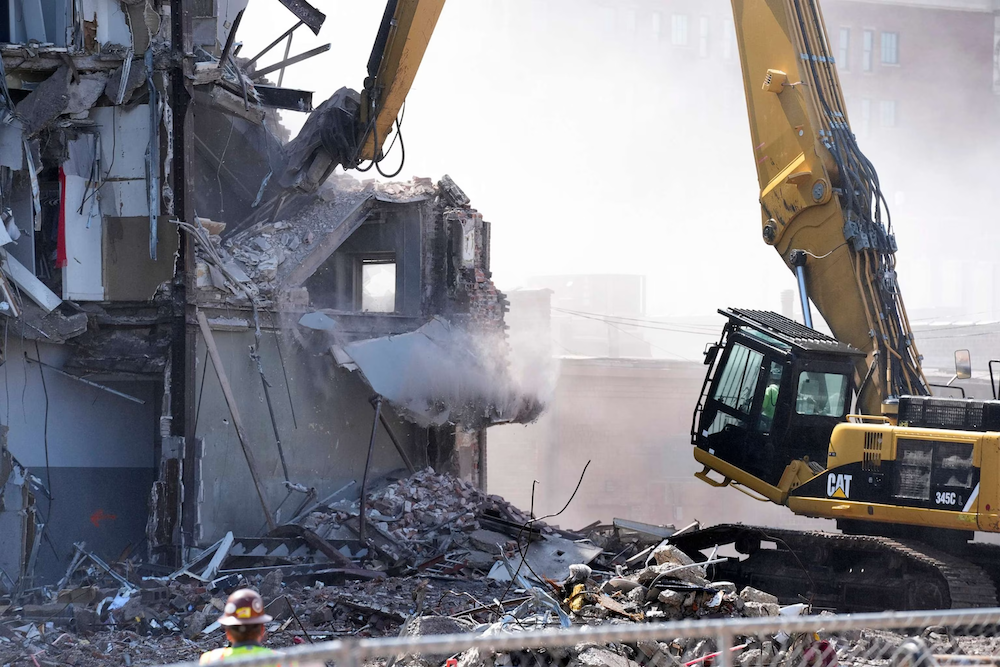
Compliance Role of Industrial Demolition Contractors
Compliance is essential when it comes to industrial demolition. Throughout the demolition process, industrial demolition contractors are essential in making sure that all laws and safety requirements are followed. With their experience, they handle intricate compliance requirements and guarantee that all procedures are followed legally.
Businesses may feel secure knowing that their demolition project is in capable hands by working with a reliable industrial demolition contractor. These experts possess the skills and expertise necessary to spot any compliance problems early on and take proactive measures to resolve them. They make sure that every task is done within the bounds of ethics and the law by keeping up with the most recent rules.
OUR SERVICES
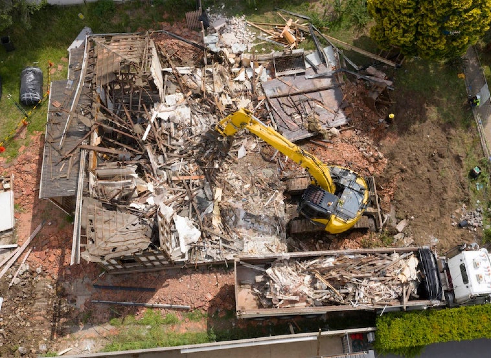
Structure Demolition. Residential, Commercial & Industrial
If your structure poses a health, safety, or environmental risk, demolition can prevent costly citations or fatal accidents. While this may seem daunting, you are just a phone call away from having your residential demolition done professionally, responsibly, and at a great price.
Talk to a Demolition Specialist Now! 916.249.5001
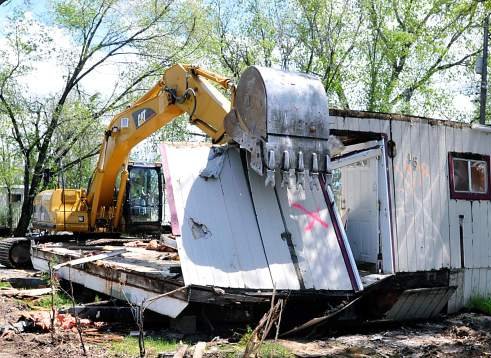
Mobile Home Demolition
We demolish and haul away mobile homes. Any size, anywhere, anyhow. We are fast, clean and competitive. We serve most of Northern California. There are many factors to consider when removing or demolishing your old trailer, mobile home, or manufactured home like: the processes involved, costs, time, contractors, debris, and permits.
Talk to a Demolition Specialist Now! 916.249.5001
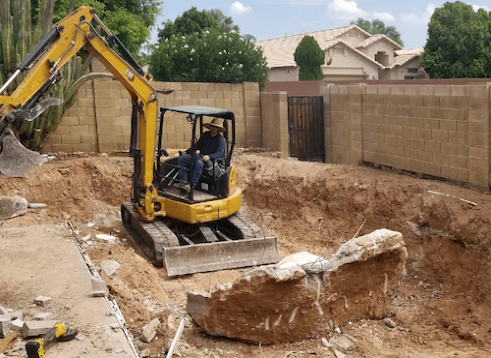
Pool Demolition
When removing a pool in Sacramento, California with the professional demolition team of Maxton Demo, you’re guaranteed peace of mind from beginning to end. From your initial request for an estimate to clean-up, you can expect our pool demolition process that’s completely professional and safe.
Talk to a Demolition Specialist Now! 916.249.5001
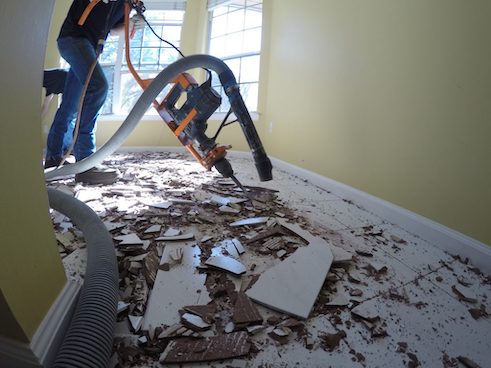
Floor Demolition
Flooring demolition, like any other major home renovation work, requires a specific set of skills and tools to be performed properly. You need experts in flooring demolition to get you the best floors possible. Contact us to find out more about how we can help you today.
Talk to a Demolition Specialist Now! 916.249.5001
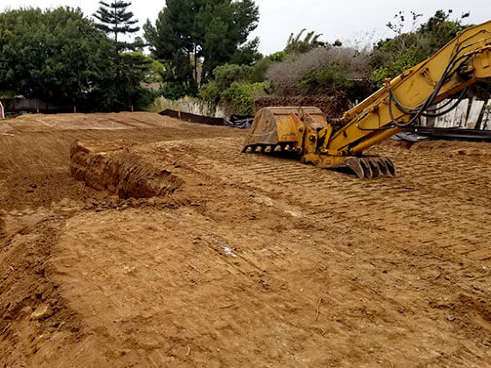
Grading & Excavating
If you need an experienced excavator and grader in Sacramento, call us today. One of the many reasons that residential, commercial, and industrial customers choose to work with us is because we’re able to provide a broad range of services to help construction-related projects get done in less time and at a reduced cost.
Talk to a Demolition Specialist Now! 916.249.5001

Roof Snow Removal
Heavy snow & ice dams can cause significant roof and home damage. Roof Snow removal is our specialty during the winter months. Serving the Sacramento, California area for 10 years, we can get your roof snow removed and promise a quick response and reasonable rates.
Talk to a Demolition Specialist Now! 916.249.5001
Compliance is essential for industrial demolition
For several reasons, compliance in industrial demolition is crucial. First and foremost, it guarantees the security of the laborers engaged in the demolition procedure. Risks associated with industrial demolition sites include exposure to toxic compounds, falling debris, and structural instability. Contractors may reduce these hazards and provide a secure working environment by following compliance rules.
Second, adherence contributes to environmental preservation. Lead-based paint and asbestos are two examples of dangerous elements that may need to be removed during industrial deconstruction. These substances have the potential to endanger human health and the environment if improperly handled. By ensuring that the right procedures are followed for the safe removal and disposal of these items, compliance helps to reduce the environmental effect.
Compliance also guarantees that the demolition procedure is conducted in an ethical and legal way. Through securing the required licenses and adhering to rules, contractors steer clear of legal troubles and possible penalties.
In addition to reducing disturbances and preserving the company’s positive image, compliance guarantees that the demolition will not adversely impact nearby properties or the neighborhood.
Standards and Guidelines for Industrial Demolition
To guarantee compliance, industrial demolition contractors are required to abide by a number of rules and requirements. The public, the environment, and the workforce are all protected by these laws. Among the important laws and guidelines are the following:
Regulations put out by the Occupational Safety and Health Administration (OSHA): OSHA establishes safety requirements for construction and demolition sites, including protocols for fall prevention, hazard communication, personal protective equipment, and more.
Regulations from the Environmental Protection Agency (EPA): The EPA controls the elimination and disposal of dangerous substances, including asbestos and paint that contains lead. Specific procedures for the safe handling, removal, and disposal of these items must be adhered to by contractors.
Standards set out by the National Fire Protection Association (NFPA): The NFPA offers recommendations for fire safety on building and demolition sites. To reduce the chance of fires occurring during the demolition process, contractors are required to follow these guidelines.
Local construction norms and regulations: These might differ from one jurisdiction to the next, and contractors need to abide by them as well. These regulations address a variety of topics, including dust management, noise levels, and structural integrity.
Industrial demolition contractors may make sure that their job satisfies all criteria by keeping up with these rules and standards.
Precautions for Industrial Demolition Safety
Industrial demolition contractors place a high premium on worker safety and take several precautions to reduce hazards. Among the crucial safety precautions are:
Personal protective equipment (PPE): To protect oneself from possible risks, workers must wear the necessary PPE, such as hard helmets, safety goggles, gloves, and breathing protection.
Site-specific safety plans: Contractors create safety plans tailored to a given site that list possible dangers and specify the steps that must be taken to reduce them. These plans could include how to handle dangerous products, operate at heights, and maintain equipment properly.
Frequent safety training is provided to employees to make sure they understand possible dangers and how to manage them. Topics like safe equipment use, emergency protocols, and danger identification are covered in this course.
Contractors make sure that all machinery and equipment used in the demolition process is properly maintained and operated by workers with the necessary training. To find any possible safety concerns, routine inspections are carried out.
Industrial demolition contractors reduce the likelihood of mishaps or injuries and provide a safe working environment by putting these safety precautions into practice.
Environmental Factors in the Demolition of Industrial Structures
If industrial demolition is not done properly, it may have a big effect on the environment. Throughout the demolition process, contractors need to take into account a number of environmental issues. Among these things to think about are:
Hazardous material removal: Hazardous materials like asbestos, lead-based paint, or PCBs are often found in industrial buildings. To avoid contaminating the environment, contractors must adhere to certain procedures for the safe removal and disposal of these items.
Waste management: metal, concrete, and building debris are among the many wastes produced by demolition. To reduce the effect on landfills and natural resources, contractors must guarantee appropriate waste management techniques, such as recycling or correct disposal.
Control of dust and air quality: Demolition operations may release dust and other airborne particles that might be harmful to health and degrade the quality of the air.
To reduce dust and preserve healthy air quality, contractors use techniques including water spraying, dust barriers, and air filtration devices.
Control of noise and vibration: Demolition may produce loud noises and vibrations that might annoy nearby homes or delicate ecosystems. To lessen these effects, contractors use strategies including vibration dampening, noise barriers, and schedule constraints.
Industrial demolition contractors may guarantee that the demolition process is conducted in an ecologically friendly way by taking these environmental issues into account and putting the necessary protections in place.
Procedures for Compliance and Documentation
Contractors in industrial demolition must adhere to certain procedures and keep accurate records in order to guarantee compliance. These procedures might consist of:
Permissions and approvals: Before starting the demolition project, contractors must get the required permissions and approvals from the appropriate authorities. Project plans, environmental impact analyses, and safety procedures may need to be submitted for evaluation in order to accomplish this.
Inspections and audits: To make sure that the demolition project is proceeding in accordance with rules and specifications, inspections and audits are carried out on a regular basis. Governmental organizations, independent consultants, or corporate compliance teams may conduct these inspections.
Record-keeping: Contractors keep thorough records of every action pertaining to the demolition project, such as trash disposal, safety training, permits, and inspections. These documents support compliance and might be useful for legal obligations or audits.
Notification and reporting: It may be necessary for contractors to notify the appropriate authorities of certain situations, including accidents, environmental spills, or safety infractions. Timely reporting guarantees openness and facilitates the implementation of suitable measures.
Industrial demolition contractors help reduce the risk of non-compliance concerns by demonstrating their commitment to compliance, adhering to these compliance practices, and keeping appropriate paperwork.
Industrial Demolition Contractor Certifications and Training
Industrial demolition contractors have specialized training and certifications in order to fulfill their compliance duties in an efficient manner. These credentials attest to their proficiency with safety procedures, legal requirements, and industry best practices. The following are a few important certifications held by industrial demolition contractors:
The Certified Demolition Safety Manager (CDSM) certification covers subjects including emergency response, risk assessment, hazard identification, and safety planning. It focuses on safety management in demolition projects.
Supervisor of Asbestos Abatement: In industrial buildings, asbestos is often encountered as a hazardous element. Contractors who remove asbestos are required to possess credentials attesting to their proficiency in managing and properly discarding asbestos.
OSHA 30-Hour Construction Training: This course offers a thorough understanding of OSHA rules and safety procedures unique to the building and demolition sectors. Topics like equipment operation, danger communication, and fall prevention are covered in this training.
Certification of an Environmental Management System (EMS): An EMS certifies a contractor’s adherence to environmental laws and their dedication to environmental stewardship. It guarantees that contractors have procedures in place to control and lessen environmental hazards.
Industrial demolition contractors may boost their reputation and reassure customers that they possess the requisite knowledge to manage compliance-related issues by acquiring these certificates.
Technology’s Function in Ensuring Compliance
In industrial demolition, technology is crucial to maintaining compliance. To increase productivity, strengthen safety precautions, and expedite compliance procedures, a variety of tools and software are available.
The following are a few of the technologies that industrial demolition contractors use:
Building Information Modeling (BIM): Before demolishing a building, contractors might make intricate 3D models of it using BIM software. This aids in identifying any dangers, organizing the demolition procedure, and guaranteeing legal conformity.
Environmental monitoring systems: During the demolition process, these systems use sensors to track vibration, noise levels, and air quality. Contractors may proactively handle compliance concerns and make appropriate modifications with the use of real-time data.
Software for project management: Throughout the course of the project, contractors may keep track of licenses, inspections, and paperwork with the use of these tools. They guarantee that nothing is lost and provide a consolidated platform for handling compliance-related data.
Before beginning the actual demolition, contractors may use virtual reality (VR) and augmented reality (AR) technology to instruct personnel on safety measures, detect possible compliance concerns, and simulate various demolition situations.
Industrial demolition contractors may maximize project results, improve safety protocols, and strengthen compliance efforts by using this technology.
The Advantages of Employing Industrial Demolition Contractors Who Comply
An essential component of industrial demolition is compliance. In order to provide companies with a safe and legal demolition procedure, industrial demolition contractors are essential in making sure that all laws and safety requirements are followed. Contractors safeguard the public, the environment, and their employees by putting compliance first. They handle complicated compliance requirements, get required licenses, and put appropriate safety precautions in place.
There are several advantages to hiring compliant industrial demolition contractors, such as reduced risks, adherence to ethics and the law, and an enhanced reputation. These experts guarantee that industrial demolition projects are carried out with safety, efficiency, and environmental responsibility in mind, thanks to their expertise, experience, and dedication to compliance.
In summary, compliance is a basic need in industrial demolition, not just a checkbox. Compliance-focused industrial demolition contractors make sure that projects run smoothly, that worker safety and health are protected, that the environment is preserved, and that moral and legal standards are upheld.
Businesses may choose an industrial demolition contractor wisely and contribute to a safer and more sustainable future by realizing the value of compliance.
Safety procedures are important for industrial demolition.
Various occupational risks make industrial demolition operations intrinsically dangerous. Workers are more vulnerable to mishaps, injuries, and even deaths when appropriate safety procedures aren’t followed. In addition, there may be legal ramifications and environmental harm from inadequate safety precautions.
Therefore, in order to reduce hazards and guarantee everyone’s wellbeing, it is essential to emphasize safety and set up thorough processes.
Risks to Workers in Industrial Demolition
There are several possible dangers at industrial demolition sites that might seriously endanger personnel. Among these risks are exposure to poisonous materials, height falls, electrical dangers, crumbling buildings, and particle releases into the atmosphere. We may create focused safety procedures that handle each unique risk by recognizing and comprehending these dangers, which will eventually result in a safer working environment.
Regulations Governing Industrial Demolition Safety
To protect the public’s and employees’ safety, the demolition business is governed by strict laws and guidelines. Industrial demolition projects are subject to norms and criteria imposed by regulatory agencies like the Occupational Safety and Health Administration (OSHA).
The correct handling and disposal of hazardous items, fall protection, respiratory protection, and hazard communication are just a few of the topics covered by these standards. It is not only required by law but also morally right to abide by these laws.
Important Safety Procedures for Industrial Demolition Operations
Complete Risk Assessments: Prior to starting any demolition project, a thorough risk assessment has to be carried out. This entails locating possible risks, assessing their seriousness and probability, and putting control mechanisms in place to reduce or eliminate them. Risk assessments must be carried out by certified experts who are well-versed in the particular dangers connected to industrial deconstruction.
Procedures for Effective Communication: In industrial demolition operations, efficient and transparent communication is crucial. To guarantee that employees are aware of possible risks, comprehend safety procedures, and are able to report any accidents or safety concerns quickly, communication channels should be set up. Having frequent safety meetings, toolbox presentations, and using two-way radios and other communication devices may all help improve on-site communication.
Use of Personal Protective Equipment (PPE): In industrial demolition operations, PPE is essential to guaranteeing worker safety. Protective equipment (PPE) consists of things like respirators, hard helmets, safety glasses, gloves, and high-visibility vests. Workers should get enough instruction on how to use, maintain, and dispose of personal protective equipment (PPE). In order to make sure that PPE is in excellent condition and to replace it as required, routine inspections should also be carried out.
In industrial demolition, personal protective equipment (PPE) is used.
In industrial demolition operations, personal protective equipment (PPE) is essential for protecting personnel from a variety of risks. The chosen kind of personal protective equipment (PPE) should be determined by the hazards that have been recognized. Hard helmets, for instance, guard against damage to the head from falling items, while safety glasses cover the eyes from flying debris.
Employees must be trained in the proper handling, upkeep, and use of PPE. PPE must be routinely inspected to make sure it is in excellent working order and to replace it as required. Workers may considerably lower their risk of injury and guarantee their safety at work by using PPE appropriately.
Industrial Demolition Workers’ Certification and Training
For individuals involved in industrial demolition operations, appropriate training and certification are essential. Specialized training is required for demolition professionals in order to provide them with the skills and knowledge needed to carry out their jobs safely. Topics including danger identification, equipment functioning, emergency protocols, and the safe handling of hazardous items must be included in this training.
Workers may get recognized credentials verifying their proficiency in safety procedures by enrolling in certification programs like the Demolition Safety Certification Program offered by the National Demolition Association. Employers may show their dedication to workplace safety and guarantee that their staff members have the skills needed to successfully reduce hazards by funding training and certification programs.
Safety Audits and Inspections for Industrial Demolition
To provide a safe working environment during industrial demolition operations, it is essential to conduct routine safety inspections and audits. These inspections must be carried out by certified safety experts who are able to spot any risks, assess how well the current safety procedures are working, and suggest changes. Every facet of the project, such as the tools, personal protective equipment (PPE), protocols for communication, and compliance with regulations, should be inspected.
Moreover, audits provide a chance for ongoing development by assisting in identifying any holes or inadequacies in the safety program. Through consistent examination and assessment of safety procedures, organizations may adjust to changing circumstances and guarantee that their safety measures stay current and efficient.
Final Thoughts: Guaranteeing Security in Industrial Demolition Initiatives
The first concern on any industrial demolition job should always be safety. We are able to reduce hazards, safeguard employees, and provide a safe demolition environment by putting in place thorough safety standards, following legal requirements, offering appropriate training and certification, and carrying out frequent inspections and audits.
Every project we embark on at Maxton Demo is dedicated to upholding the highest safety standards. Let’s work together to put safety first and create a brighter future for the demolition sector.
Do you have a Question?
Talk to a Demolition Specialist Now! 916.249.5001
Request Formal Quote